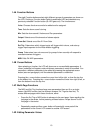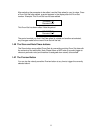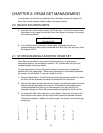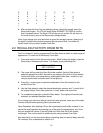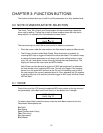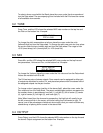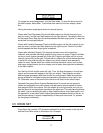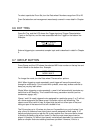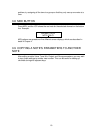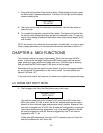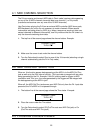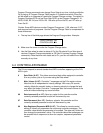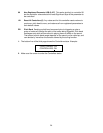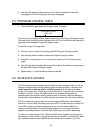
18
To select a particular Drum Set, turn the Data wheel. Numbers range from 00 to 20.
Drum Set selection and management was already covered in more detail in Chapter
2.
3.6 EXT TRIG
Press Ext Trig, and the LCD shows the Trigger input and Trigger Characteristics
(Type) on the top line, and the note associated with the Trigger on the bottom line.
Example:
TRIG: 01 TYPE: 01
NOTE: 050 D2
External triggering is a somewhat complex topic and is described in detail in Chapter
5.
3.7 GROUP BUTTON
Press Group, and the LCD shows the selected MIDI note number on the top line and
drum’s Mode on the bottom line. Example:
NOTE: 054 F#2
MODE: MULTI
To change the mode, turn the Data wheel. There are four options:
Multi: When triggering a note repeatedly, each trigger will cause the sound to go
through its entire decay. This is useful with cymbals, since early strikes continue to
decay as you play later strikes.
Single: When triggering a note repeatedly, a new hit will automatically terminate any
sound that is still decaying. This is useful with many percussion sounds (such as
tambourine, agogo, etc.).
Group 1 and 2: A newly-triggered voice assigned to a particular group (1 or 2) will cut
off a voice assigned to the same group if the older voice is still sustaining. The
classic use of this is with hi-hats; a closed high-hat will cut off an open hi-hat, and
hitting an open hi-hat sound will cut off a closed hi-hat.
The D4 can play up to 16 voices at a time, so it’s possible to run out of voices if you
play a flurry of notes and have lots of drum sounds assigned to Multi mode. If 16
sounds are playing and you ask the D4 to play another one, the sound that’s closest
to finishing its decay cycle will be “stolen” so that the most recent sound can be
played. In practice, it’s difficult (and usually not artistically desirable!) to create drum
parts so complex that voice-stealing becomes a problem. However, if this is a



